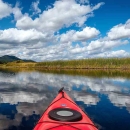Visit Us
National wildlife refuges offer us all a chance to unplug from the stresses of daily life and reconnect with our natural surroundings.
The trails of the Cherry Valley National Wildlife Refuge provide ample opportunity for wildlife observation and photography. Wild turkeys can be seen strutting in the fields, warblers flit around in the mature trees and shrubby field borders, and frogs can be heard calling in the wet areas. Some may even catch a glimpse of a bald eagle perched above the waters of Cherry Creek. There is no shortage of sights or sounds on a wildlife refuge! To ensure wildlife and plants are protected, please remain on the trails. Pets are not allowed.
Location and Contact Information
- Cherry Valley National Wildlife RefugeView Details2138 Croasdale Road Stroudsburg, PA 18360-0050
About Us
Cherry Valley National Wildlife Refuge was established by proclamation in December 2008 for the conservation of migratory birds and federal trust species, and the habitats they depend on. The lands and waters of the Cherry Valley have been widely recognized for their valuable natural resources. These include a diverse mosaic of wetland and upland habitats that support an unusually large number of federal trust species, including five federally listed threatened or endangered species. The Kittatinny Ridge (which flanks the south side of the valley) has been designated an Important Bird Area by the Pennsylvania Audubon Society, and is a well-known migration flyway that concentrates up to 20,000 migrating raptors and more than 140 bird species every fall. Large blocks of unfragmented forest along the ridge also serve as valuable breeding areas for interior-forest birds.
What We Do
Wildlife conservation is at the heart of the National Wildlife Refuge System. It drives everything on U.S. Fish and Wildlife Service lands and waters managed within the Refuge System, from the purposes for which a national wildlife refuge national wildlife refuge
A national wildlife refuge is typically a contiguous area of land and water managed by the U.S. Fish and Wildlife Service for the conservation and, where appropriate, restoration of fish, wildlife and plant resources and their habitats for the benefit of present and future generations of Americans.
Learn more about national wildlife refuge is established to the recreational activities offered to the resource management tools used. Using conservation best practices, the Refuge System manages Service lands and waters to help ensure the survival of native wildlife species.
Our Organization
Our Species
Cherry Valley National Wildlife Refuge was established for the conservation of migratory birds, federal trust species, and the habitats they depend on. The lands of the Cherry Valley include a diverse mosaic of wetland and upland habitats that support an unusually large number of federal trust species, including five federally listed threatened or endangered species. The Kittatinny Ridge (which flanks the south side of the valley) has been designated an Important Bird Area by the Pennsylvania Audubon Society, and is a well-known migration flyway that concentrates up to 20,000 migrating raptors and more than 140 bird species every fall. Large blocks of unfragmented forest along the ridge also serve as valuable breeding areas for interior-forest birds.
Get Involved
Whether you want to further conservation, learn more about nature or share your love of the outdoors, you’ve come to the right place. National wildlife refuges provide many opportunities for you to help your community and fish and wildlife by doing what you love.
National wildlife refuges partner with volunteers, youth groups, landowners, neighbors and residents of urban and coastal communities to make a lasting difference.
Find out how you can help make American lands healthier and communities stronger while doing something personally satisfying.
Volunteers: Gain new experiences and meet new people while helping to advance wildlife conservation. To see if new volunteers are being accepted at this time, please email Jared_Green@fws.gov
Friends: Join neighbors in helping refuges restore habitat and expand access to green space. For more information about the Friends of Cherry National Wildlife Refuge please visit their website here or visit their Youtube page here.
Landowners: Learn how you can partner with the Fish and Wildlife Service to voluntarily restore land.
Local Groups:
Find out how communities can work with refuges better for wildlife and people.
Youth: Explore paid and unpaid opportunities to learn and develop leadership skills. To see if new internships for college credit are being accepted at this time, please email Jared_Green@fws.gov
Projects and Research
Research projects at the Cherry Valley National Wildlife Refuge focus on the study/management of freshwater turtles, migratory birds, habitat management and restoration/monitoring of the Cherry Creek.

























